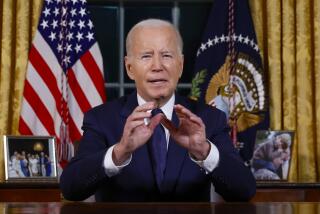America’s waning influence
Is America in decline? Is our global influence waning?
Expect that question to get plenty of airtime as the presidential campaign heats up. According to the Republicans, President Obama’s fundamental foreign policy problem is that he thinks America is a fading power and all we can hope for is to “manage the decline.”
It’s a claim that’s long been echoing through the conservative blogosphere, and now the campaign trail. John Bolton, who’s joined Mitt Romney’s foreign policy team, minces no words: Obama “believes that the role of America in the world is to be a well-bred doormat.” Romney (who wrote a whole book on the theme of American greatness) is equally strident: “I reject the view that America must decline.” Obama might be inclined to “wave the white flag of surrender,” he said, but “God did not create this country to be a nation of followers.”
Stung by Republican attacks, Obama has been insisting that he’s no declinist. In last week’s State of the Union address, he nearly out-Romneyed Romney, proclaiming, “Anyone who tells you that America is in decline or that our influence has waned, doesn’t know what they’re talking about.”
That’s dangerous pabulum. Any honest diplomat will tell you that American power and global influence is waning, and if we shy away from acknowledging that fact, we’ll only speed up the process.
American influence is waning for two reasons, the first of which should potentially be a source of comfort, not despair. While we continue to have the world’s most formidable military, America’s power in the world is declining simply because once-weak states are growing stronger. Europe, despite its current woes, is an economic and diplomatic force to be reckoned with. China, India and Brazil are emerging as regional powerhouses with increasingly global reach.
As a result of “the rise of the rest,” U.S. power is declining in a relative sense. In the last decade, for instance, our share of global output dropped from 23.5% to 19.1%. And this is a trend that began decades ago. In his 1987 National Security Strategy, President Reagan noted, “The United States no longer ha[s] an overwhelming economic position vis-a-vis Western Europe and the East Asia rimland.” In 1990,President George H.W. Bushechoed this theme in his National Security Strategy: “It was inevitable that our overwhelming economic predominance after the war would be reduced.”
If Reagan were alive today, conservatives would excoriate him as a declinist. But as Reagan recognized, a decline in relative American power is a good thing, not a bad thing — if we can turn rising states into solid allies. Remember “Gulliver’s Travels”? True, it wasn’t much fun for Gulliver to be the little guy in the land of Brobdingnagian giants, but it was even less fun to be a giant among the Lilliputians. Like Gulliver, America will prosper most if we can surround ourselves with friendly peer and near-peer states. They give us larger markets and improve burden-sharing; none of the global problems that bedevil us can be solved by the United States alone.
But there’s another reason American influence is declining, one that should cause us far more concern. Obama put his finger on it during the State of the Union speech, when he asked whether we wanted to settle for being “a country where a shrinking number of people do really well, while a growing number of Americans barely get by.”
By many measures, we’ve hollowed out the American dream: American life expectancy ranks well below that of other industrialized democracies, and the same is true for infant mortality rates and elementary school enrollment rates. We have the highest documented per capita incarceration rate in the world. And as the Occupy Wall Street movement has helped point out, we have greater income inequality in this country than in any other state in the developed world — and most states in the developing world.
Denying this decline is beyond foolish. We can’t remain a leader on the world stage if we accept domestic conditions that are moving perilously toward those of many Third World countries. And we can’t have an honest discussion about needed reforms if our heads are stuck in the sand.
There’s an irony here. It’s usually conservatives who decry the culture of self-esteem: a mentality of entitlement in our schools, a “Lake Wobegon effect” that replaces tough standards and honest criticism with grade inflation and gold stars for all. But when it comes to America’s global stature, it’s conservatives who seem most intent on insisting that America deserves a gold star, without regard for actual achievement.
Despite his State of the Union rhetoric, Obama surely knows that the issue of America’s decline is real. He should unapologetically tell it like it is. If we don’t stop lying to ourselves, the decline will be both irreversible and steep.
Rosa Brooks is a professor of law at the Georgetown University Law Center and a fellow at the New America Foundation.
More to Read
A cure for the common opinion
Get thought-provoking perspectives with our weekly newsletter.
You may occasionally receive promotional content from the Los Angeles Times.










